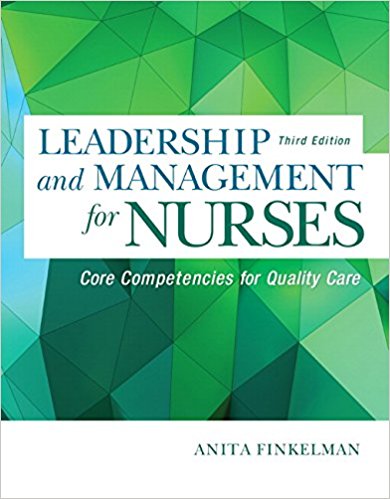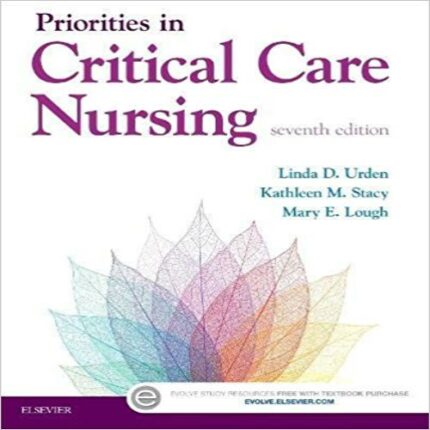Test Bank for Leadership and Management for Nurses 3rd Edition by Finkelman
Chapter 1 Conceptual Base for Leadership and Management
1) The nurse manager has asked that all staff nurses develop effective leadership competencies. How should the staff nurses interpret this request?
- This is an unrealistic expectation, because only managers are leaders.
- This is possible if the nurses learn about and use relevant leadership and management theories and styles.
- In order to become leaders, the staff nurses will have to emphasize control, competition, and getting the job done.
- Unless the staff nurses possess the traits of a natural born leader, this is an unrealistic expectation.
Answer: 2
Explanation: 1. A nurse does not need to have a formal management position with a management title to be a leader; if nurses demonstrate leadership competencies, they are considered nurse leaders.
- In today’s healthcare environment, nurses must have knowledge of relevant leadership and management theories and styles. This knowledge helps nurses emerge as leaders. Nurses are also leaders of their own nursing practices.
- Control, competition, and getting the job done are past theories and styles that are not as useful in today’s environment.
- Leadership is a skill that can be learned.
Page Ref: 7
Cognitive Level: Analyzing
Client Need/Sub: Safe and Effective Care Environment
Standards: QSEN Competencies: Patient-centered care; Teamwork and collaboration; quality improvement, safety | AACN Essential Competencies: II. Basic organizational and systems leadership for quality care and patient safety; VI. Interprofessional communication and collaboration for improving patient health outcomes; V. Healthcare policy, finance, and regulatory environments | NLN Competencies: Personal and professional development; relationship centered care; teamwork | Nursing/Integrated Concepts: Nursing Process: Assessment
Learning Outcome: LO 08. Analyze the need for more nursing leaders.
2) Peter Drucker’s view of management stimulated the shift toward the realization of the importance of participatory organizations. Which option provides a scenario that is an example of a participatory organization?
- The control of the organization is centralized, and decisions are made by upper-level management.
- Staff nurses are expected to provide support and nurturing for management’s decisions.
- The organization’s approach to leadership is autocratic and bureaucratic.
- Staff nurses provide input into planning and changes for their own unit.
Answer: 4
Explanation: 1. In participatory organizations, the control of the organization is decentralized and many decisions are made by those “on the front lines” of the organization.
- The theory is that the staff should be nurtured to promote greater leadership competency.
- According to Drucker, when staff participate in the core functions of management, the organization is more effective.
- According to Drucker, when staff participates in the core functions of management such as planning and changes for their own units, the organization is more effective.
Page Ref: 7-8
Cognitive Level: Applying
Client Need/Sub: Safe and Effective Care Environment
Standards: QSEN Competencies: Patient-centered care; Teamwork and collaboration; quality improvement, safety | AACN Essential Competencies: II. Basic organizational and systems leadership for quality care and patient safety; VI. Interprofessional communication and collaboration for improving patient health outcomes; V. Healthcare policy, finance, and regulatory environments | NLN Competencies: Personal and professional development; relationship centered care; teamwork | Nursing/Integrated Concepts: Nursing Process: Planning
Learning Outcome: LO 03. Analyze the key modern leadership theories compared to older theories and implications for nursing leadership and management.
3) Which behavior demonstrates the nurse’s competency as an emotionally intelligent leader?
- The nurse is proficient in technical skills.
- The nurse relies on policies, not options.
- The nurse supports team members.
- Productivity is not a major concern.
Answer: 3
Explanation: 1. While technical skill is important for all nurses, it is not a hallmark of a competent leader.
- Chaos theory states that solutions are not always clear and policies might not always be applied easily; other options might need to be considered.
- In Emotional Intelligent theory, team members support each other and feel supported by the team leader.
- This statement reflects the country club leadership style.
Page Ref: 11
Cognitive Level: Applying
Client Need/Sub: Safe and Effective Care Environment
Standards: QSEN Competencies: Patient-centered care; Teamwork and collaboration; quality improvement, safety | AACN Essential Competencies: II. Basic organizational and systems leadership for quality care and patient safety; VI. Interprofessional communication and collaboration for improving patient health outcomes; V. Healthcare policy, finance, and regulatory environments | NLN Competencies: Personal and professional development; relationship-centered care; teamwork | Nursing/Integrated Concepts: Nursing Process: Implementation
Learning Outcome: LO 03. Analyze the key modern leadership theories compared to older theories and implications for nursing leadership and management.










